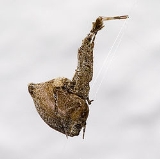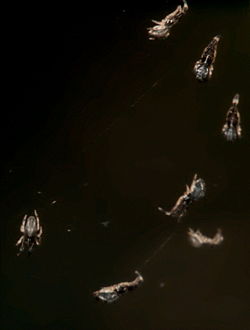
Uloborus plumipes
Encyclopedia

Old World
The Old World consists of those parts of the world known to classical antiquity and the European Middle Ages. It is used in the context of, and contrast with, the "New World" ....
cribellate
Cribellum
The cribellum is a silk spinning organ found in certain spiders. Unlike normal spinnerets, the cribellum consists of one or more plates covered in thousands of tiny spigots. These spigots produce extremely fine fibers which are combed out by the spider's calamistrum, producing silk with a wooly...
spider in the family Uloboridae. Common names are Feather-legged lace weaver and Garden center spider, due to its frequent occurrence in garden centers around the world.
Females grow up to 6mm. A stabilimentum is sometimes present. Pattern and coloration is quite variable. In contrast to U. walckenaerius
Uloborus walckenaerius
Uloborus walckenaerius is a spider in the family Uloboridae.Females grow up to 6 mm, males up to 4 mm. It has a dark grey prosoma, covered with white hairs, leaving some dark bands uncovered. The spider lives in warm, open terrain, like heathland, and weaves horizontal cribellate webs...
, it has distinct tufts of hairs on the front legs. They hang upside down in their horizontal webs. Young spiders look like dead insects and are thus hard to find in a web.
The empty egg sac can often be seen attached to house plants. It is flattish, papery and brown and about 0.5 cm long, with the shape of a dried holly
Holly
Ilex) is a genus of 400 to 600 species of flowering plants in the family Aquifoliaceae, and the only living genus in that family. The species are evergreen and deciduous trees, shrubs, and climbers from tropics to temperate zones world wide....
leaf.
Name
The species name is derived from LatinLatin
Latin is an Italic language originally spoken in Latium and Ancient Rome. It, along with most European languages, is a descendant of the ancient Proto-Indo-European language. Although it is considered a dead language, a number of scholars and members of the Christian clergy speak it fluently, and...
pluma "feather" and pes "foot".
External links
- Nick's Spiders: Uloborus plumipes (Pictures of spider and egg sacs)

